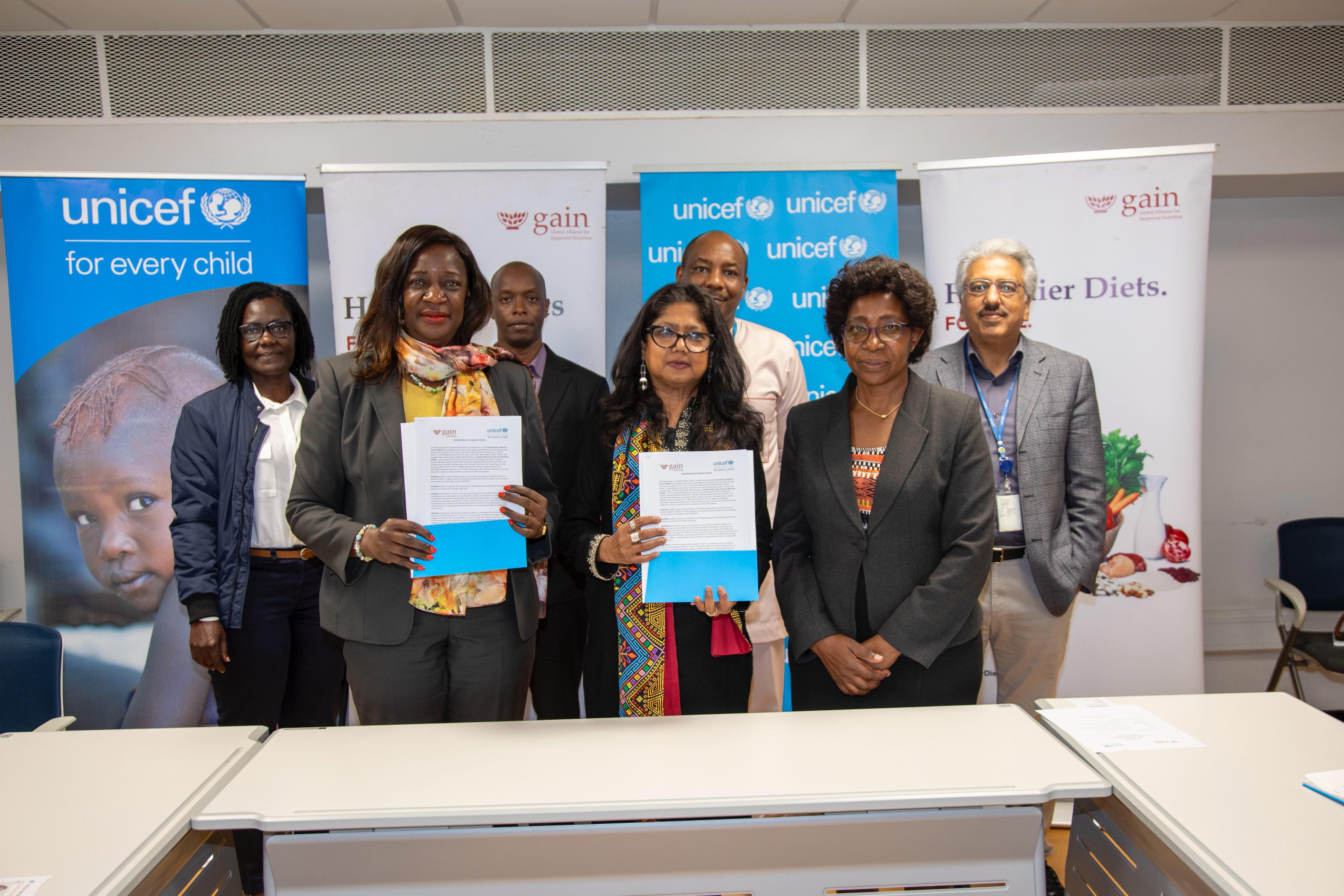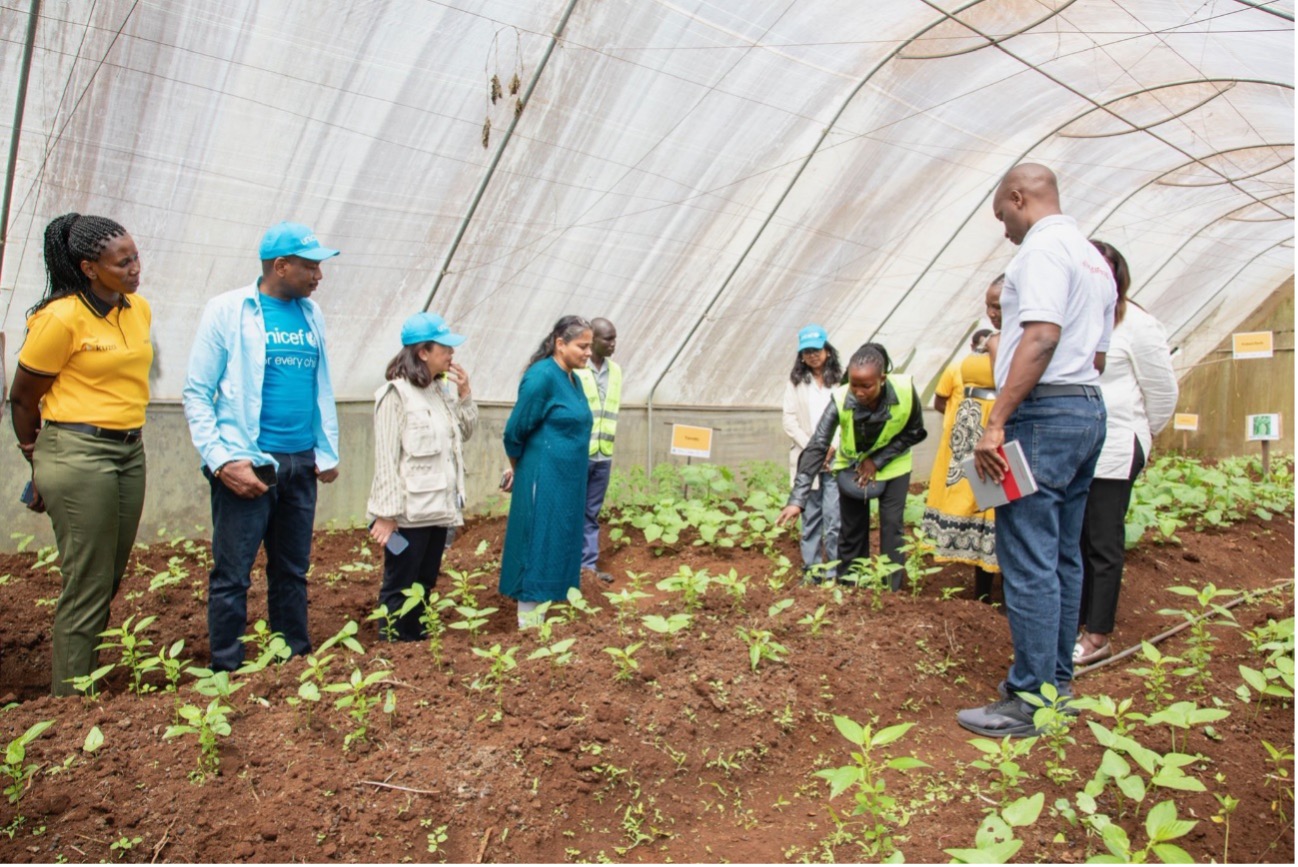GAIN Kenya is proud to announce the signing of a Memorandum of Understanding (MOU) with UNICEF Kenya to strengthen efforts to improve access to nutritious, safe, and sustainable foods for the most vulnerable. This strategic partnership underscores a shared commitment to addressing malnutrition and shaping healthier food environments for children, adolescents, and families in Kenya. The MOU was officially signed on 24th June 2025.
A Shared Vision for Healthier Diets
Under this agreement, GAIN and UNICEF will collaborate closely with the Ministry of Health and other key stakeholders to promote healthy diets and improve nutrition outcomes. The partnership will leverage advocacy, collaborative programming, and knowledge exchange to amplify efforts that prioritize the nutritional needs of children and adolescents across all stages of growth.
“Children’s right to healthier diets is non-negotiable,” said Ruth Okowa, Country Director of GAIN Kenya. “This partnership with UNICEF strengthens our resolve to make nutritious diets accessible, affordable, and desirable, ensuring that children and families can make healthier choices for better lives.”

A Learning Visit to EKYAN: Building on Success
The signing of the MOU was preceded by a joint learning visit to the Engaging Kenyan Youth in Agriculture and Nutrition (EKYAN) programme in Kirinyaga County, led by UNICEF Kenya and Kuza One (Kuza Biashara). EKYAN is equipping young agripreneurs with skills in climate-smart agriculture, nutrition, and digital innovation to drive community transformation.
During the visit, representatives from the County Government of Kirinyaga, UNICEF, GAIN Kenya, and Kuza reviewed the programme’s progress and explored its sustainability. The County shared its Wezesha Kirinyaga Agriculture Perspective and a comprehensive EKYAN Institutionalisation Strategy aimed at embedding EKYAN interventions into county development plans.
Highlights of EKYAN’s impact include training 112 youth agripreneurs, transforming 56 schools into agri-nutrition hubs, and reaching 2,700 students and 17,800 farmers. A tour of demo plots at Kerugoya School for the Deaf showcased regenerative agriculture and food safety practices in action. GAIN Kenya was honoured to join as a learning partner and applauds the County’s efforts to institutionalise EKYAN’s transformative approach.
Focus Areas of Collaboration
The MOU outlines four key areas of collaboration:
- Policy and Advocacy: GAIN and UNICEF will advocate for stronger national policies and regulations that create positive food environments. The two organizations will work together to ensure that the Kenya Nutrition Action Plan (KNAP) is fully embedded within national frameworks and backed by increased budgetary allocations. Additionally, the partnership will promote initiatives that improve the nutritional quality of meals served in schools and early childhood care centres, ensuring that children have access to safe and balanced diets while learning. Through targeted advocacy, GAIN and UNICEF will support the implementation of critical policies such as front-of-pack nutrition labelling, regulations to curb the marketing of unhealthy foods to children, and taxation measures on sugar-sweetened beverages. Efforts will also focus on expanding large-scale mandatory fortification programmes to address micronutrient deficiencies and improve dietary diversity.
- Collaborative Programming: Through joint initiatives, the partnership will connect communities, schools, and local food systems. This collaboration will strengthen vegetable value chains, establish safe and thriving school-based agri-nutrition hubs, and introduce creative nutrition education programmes and recipes through EKYAN’s innovative digital learning platforms. Beyond schools, GAIN’s Vegetables for All network of over 10,000 mama-mbogas (last-mile vegetable vendors) will be leveraged to enhance market access for nutritious foods and support women entrepreneurs who play a vital role in local food distribution. The partnership will also roll out large-scale behaviour change campaigns, combining digital and community-based approaches, to reshape food norms and inspire healthier eating habits. Young people will remain central to this agenda, with initiatives tapping into youth networks such as Yunitok, YOMA, and EKYAN’s agripreneurs to drive peer-led advocacy and action for better diets.
- Knowledge Exchange: The organizations will share best practices and lessons learned in shifting food norms, incentivizing local production of nutritious foods, and increasing demand for healthy diets. Insights from GAIN’s SUN Business Network and UNICEF’s First Foods Africa Initiative will guide collaborative approaches to engaging market actors and influencing consumer behaviour.
- Joint Resource Mobilization: The partnership aims to pool resources and amplify voices within Kenya’s nutrition landscape by mobilizing partners, supporting coordination platforms like the Scaling Up Nutrition (SUN) Civil Society Network, and developing innovative solutions to fund nutrition initiatives.
Why This Partnership Matters
Kenya’s food systems face persistent challenges in meeting the nutritional needs of children and adolescents. Nutritious and safe food options are often unavailable or unaffordable for many families, contributing to malnutrition and poor health outcomes. This partnership between GAIN and UNICEF reflects a bold, collective response to these challenges. It builds on evidence showing that when healthy food is accessible, affordable, and appealing, families make better choices that benefit their children’s long-term health.
Looking Ahead
As GAIN Kenya and UNICEF Kenya embark on this collaboration, the focus remains clear: ensuring that every child in Kenya has the right to a healthy, nutritious diet. Together, the two organizations will work to transform food systems and shift the narrative from simply fighting hunger to fostering optimal health and development for all.

A EKYAN youth agripreneur taking the delegation through a tour of a school garden/ demo plot at Kerugoya School for the Deaf in Kirinyanga County